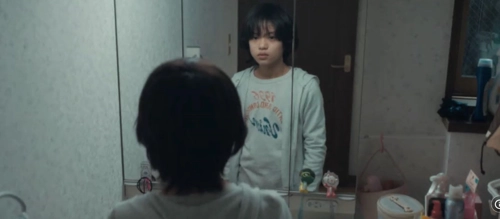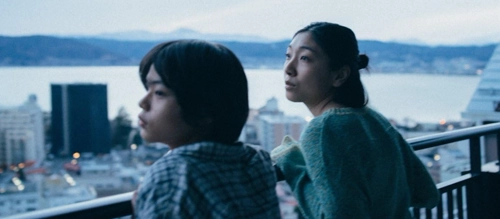Monster (2023) Review

Monster (2023)
Director: Hirokazu Kore-eda
Screenwriter: Yuji Sakamoto
Starring: Sakura Andō, Eita Nagayama, Sōya Kurokawa, Hinata Hiiragi, Yūko Tanaka, Mitsuki Takahata, Akihiro Tsunoda, Shidō Nakamura
After back-to-back projects made and set in France and South Korea (The Truth and Broker) arthouse favourite and Palme d’Or winner Hirokazu Kore-eda returns to Japan to direct a fascinating story of unreliable narrators, differing perspectives and self-repression.
Young widow Saori Mugino (Sakura Andō) struggles to look out for her son Minato (Sōya Kurokawa) who has begun acting erratically of late and may be the victim of physical abuse by his seemingly overreaching new schoolteacher Mr Hori (Eita Nagayama). But nothing is as it seems, as we soon find out from seeing the same events being replayed from three different perspectives – everyone has their reasons for doing what they do and each has something to hide.
For a time this looks like we’re going to see Kore-eda working in the style of one of his contemporaries, horror-thriller specialist Kiyoshi Kurosawa (Cure). But soon, what seems to be building to an exploration of the dark underbelly of Japanese suburbia gives way to something far more subtle and much sadder. Despite the title, this is no horror movie, unless you consider ostracisation and the inability to express who you really are to be nightmare fuel.
Perhaps in response to increasingly prominent news and social media coverage on the subject, the last decade or so has seen quite a number of stories from around the world centred around teachers accused of horrible acts and communities driven into a frenzy, often by children knowing full well the power they wield (see recent release About Dry Grasses). Child abuse in all its forms is rightly seen as among the most abhorrent crimes you can commit, but once someone is tarred with that brush, justifiably or not in the case of celebrities in recent years, there is often no way to repair their reputation. For instance, Thomas Vinterberg’s The Hunt from 2012 saw a preschool teacher become the victim of an unfounded witch-hunt when a child unthinkingly told a lie out of anger, and just last year Blue Jean saw a lesbian PE teacher manipulated by a closeted girl she was trying to help during the era of Section 28. Whether or not this film’s teacher is the guilty party won’t be divulged here so as not to ruin the film’s essential power, but suffice to say Monster plays things a little differently by considering many angles while covering some similar thematic ground.

Monster is one of those films that really does play better if you go in knowing next to nothing about it. There is a sensitively handled LGBTQ+ element to the story that has been rightly praised by critics and film festival-goers over the past year, but getting into who it involves and exactly how it comes about would ruin some of the film’s hardest-hitting and most tender moments. This is some powerful stuff though, and a pretty unconventional handling of this kind of subject matter.
A lot of the effectiveness of this kind of film hinges on the performances, and our three leads – especially Sakura Andō (Godzilla Minus One) – really bring this story and their characters’ complex experiences to life. Ryûto Kondô’s camera more often than not unobtrusively hangs back, which is especially noticeable during a standout scene where the framing hardly shifts as Saori exasperatingly confronts the ineffective school leadership in the principal’s office, the teachers unable to offer a satisfactory explanation for Mr Hori’s apparent transgressions and all standing to bow and apologise in unison, in doing so closing her disbelieving face off from the camera’s view.
There are few directors today who are better at working with children, and getting an affecting and natural performance from them, than Hirokazu Kore-eda. It would be fascinating to see his method, what he actually tells or asks young and inexperienced actors like Sōya Kurokawa and Hinata Hiiragi to do in order to seem to convey emotions and complex ideas beyond their years so effortlessly.
The final work from prolific composer Ryuichi Sakamoto also certainly helps to emphasise the fragility and emotional delicacy of these characters’ formative relationships without being heavy-handed.
Eschewing any stylistic choice that will bring you out of the experience like on-screen time markers or optical effects, the only immediate indication that we have transitioned to someone else’s perspective is the repeated sight of a burning building lighting up the Tokyo night sky which everyone saw from a different angle at the beginning of the film. The film is visually low-key but emotionally tumultuous and as we head into the final act it feels on a par with a disaster movie, not just because of the seasonal typhoon drawing in but because we are hoping beyond hope for everyone to get through it all OK.
Taking a purposefully ambiguous yet evocative title and running with it, Monster is very nearly up there with the upper echelon of Hirokazu Kore-eda’s all-but spotless filmography, but with a director who doesn’t really miss that’s not exactly a point against the film. It doesn’t offer easy answers regarding its characters and who behaved the way they should or otherwise, and those who crave neat resolutions won’t find one here, but Kore-eda continues to spotlight people who intentionally or not find themselves on the edge of society and finds a direct line to their very conflicted souls.
Score: 22/24

